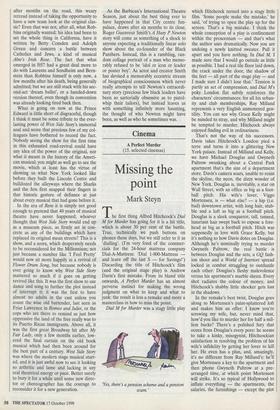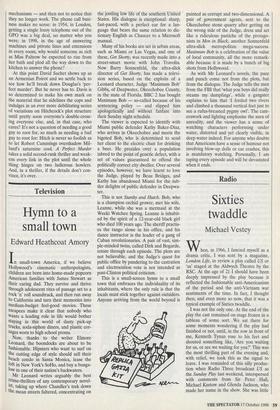Cinema
A Perfect Murder (15, selected cinemas)
Missing the point
Mark Steyn
The first thing Alfred Hitchcock's Dial M for Murder has going for it is a hit title, which is about 30 per cent of the battle. True, technically we push buttons on phones these days, but we still refer to it as `dialling'. (I'm very fond of the commer- cials for the 24-hour mattress company Dial-A-Mattress: 'Dial 1-800-Mattress and leave off the last S — for Savings!') Discarding the title of Hitchcock's film (and the original stage play) is Andrew Davis's first mistake. From its bland title onwards, A Perfect Murder has an almost perverse instinct for making the wrong judgment on what to keep and what to junk: the result is less a remake and more a masterclass in how to miss the point.
Dial M for Murder was a stagy little play `Yes, there's a pension scheme and a pension scam.' which Hitchcock turned into a stagy little film. `Some people make the mistake,' he said, 'of trying to open the play up for the screen. That's a big mistake. I think the whole conception of a play is confinement within the proscenium — and that's what the author uses dramatically. Now you are undoing a newly knitted sweater. Pull it apart and you have nothing. In Dial M, I made sure that I would go outside as little as possible. I had a real tile floor laid down, the crack under the door, the shadow of the feet — all part of the stage play — and I made sure I didn't lose that.' Tension is partly an act of compression, and Dial M's poky London flat subtly reinforces the characters' circumstances: for all his urban- ity and club memberships, Ray Milland represents a very English unmoneyed gen- tility. You can see why Grace Kelly might be minded to stray, and why Milland might be tempted to murder. Hitchcock always enjoyed finding evil in ordinariness.
That's not the way of his successors. Davis takes Hitchcock's London pied a terre and turns it into a glittering New York palace. Instead of Milland and Kelly, we have Michael Douglas and Gwyneth Paltrow swanking about a Central Park apartment that's the size of a department store. Davis's camera soars, unable to resist the skyline, the neon, the dizzy wonder of New York. Douglas is, inevitably, a star on Wall Street, with an office as big as a foot- ball pitch. His wife's lover, Viggo Mortensen, is — what else? — a hip (i.e. bad) downtown artist, with long hair, stub- ble and a loft as big as a football pitch. Douglas is a sleek conqueror, tall, tanned, luxuriant hair swept back to expose a fore- head as big as a football pitch. Hitch was supposedly in love with Grace Kelly, but it's nothing to how Davis dotes on Douglas. Although he's nominally trying to murder Gwyneth Paltrow, the real battle is between Douglas and the sets, a GQ fash- ion shoot and a World of Interiors spread locked in combat struggling to outdazzle each other: Douglas's fleshy malevolence versus his apartment's marble sheen. Every shot radiates the colour of money, and Hitchcock's shabby little shocker gets lost in the shadows.
In the remake's best twist, Douglas goes along to Mortensen's paint-splattered loft and makes him an offer: I know you're screwing my wife, but, never mind that, how'd you like to murder her for half a mil- lion bucks? There's a polished fury that oozes from Douglas's every pore: he seems to take a kinky, misogynist, Hitchcockian satisfaction in resolving the problem of his wife's infidelity by getting her lover to kill her. He even has a plan, and, amazingly, it's no different from Ray Milland's: he'll give Mortensen a key to the apartment and then phone Gwyneth Paltrow at a pre- arranged time, at which point Mortensen will strike. It's so typical of Hollywood to inflate everything — the apartments, the salaries, the furnishings — except the plot mechanisms — and then not to notice that they no longer work. The phone call busi- ness makes no sense: in 1954, in London, getting a single lousy telephone out of the GPO was a big deal, no matter who you were; in 1998, in the age of answering machines and private lines and extensions in every room, why would someone as rich as Miss Paltrow be expected to rise from her bath and plod all the way down to the kitchen to answer the phone?
At this point David Suchet shows up as an Armenian Poirot and we settle back to see how he'll break down Douglas's 'per- fect murder'. But he never has to. Davis is so determined to make his own mark on the material that he sidelines the cops and indulges in an ever more debilitating series of variations on Hitchcock's plot structure until pretty soon everyone's double-cross- ing everyone else, and, in that case, who cares? It's not a question of needing a good guy to root for, so much as needing a bad guy to root for: Hitch is never so foolish as to let Robert Cummings overshadow Mil- land's saturnine cool. A Perfect Murder takes a solid second-rank thriller and weak- ens every link in the plot until the whole thing hinges on two ludicrous howlers. And, in a thriller, if the details don't con- vince, it's over.











































































 Previous page
Previous page